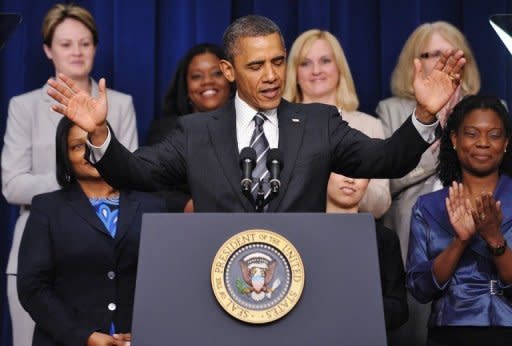US Republicans defend record with women
Accused of waging "war against women," Republicans are fighting back, defending their record to avoid losing the battle for women's votes in November's general elections. "I know that our party has traditionally faced a gender gap, and I think that the Democratic Party has done an effective job trying to mischaracterize our views," Mitt Romney, the Republican frontrunner to take on President Barack Obama in the White House race, said this week. For weeks, Democrats have piled on criticism of their Republican foes on this issue, accusing them of neglecting women's rights by favoring conservative policies on abortion, contraception and other social concerns. The Democratic president, who has a clear gender advantage as the face-to-face general election campaign nears, hosted a Forum on Women and the Economy at the White House on Friday in which he defended his administration's records on equal pay and flexibility in the workplace. "When we talk about these issues that primarily impact women, we've got to realize they are not just women's issues. They are family issues, they are economic issues, they are growth issues, they are issues about American competitiveness," said Obama. Women, who represent about 53 percent of the American electorate, backed Obama by 56 percent in the 2008 elections. A recent USA Today/Gallup poll found that Obama maintains an overwhelming lead among women in the nation's top 12 battleground states, beating Romney 2-1 among women under 50 who are registered voters. Among all women voters, Obama led Romney 54-36 percent. Faced with these alarming numbers, the Republicans are fighting back, even as a bitter nomination battle for the party's pick to challenge Obama drags on. South Carolina Governor Nikki Haley said Romney, whom she has endorsed, has a secret weapon in his wife, Ann Romney, for connecting with women voters, and would have to answer women's concerns on the campaign trail. The survey found that men were split about evenly between Obama and Romney. Women "are obviously not relating to him as much as we want them to," she acknowledged on CNN. But Haley added: "That means he has to work harder, he needs to continue to do that, and he needs to bring that one golden bullet he's got, which is Ann Romney." Candidate Romney said his wife actually reports to him "regularly" about women's top concerns -- "the economy and getting good jobs for their kids and for themselves." The former Massachusetts governor has made rescuing the sour economy from the brink the main focus of his campaign. Republican National Committee chief Reince Priebus protested against the anti-women label Democrats have sought to impose on his party. "If the Democrats said we had a war on caterpillars, and mainstream media outlet(s) talked about the fact that Republicans have a war on caterpillars, then we (would) have problems with caterpillars," he told Bloomberg television. "The fact of the matter is, it's a fiction." Ohio University history professor Katherine Jellison said Republicans' public contempt for the criticism has simply "further damaged their reputation in women's eyes." "Even though Romney himself has not been one of the loudest participants in that kind of rhetoric, the fact that he wears the Republican label right now and that he hasn't forcefully disapproved some of the comments of his fellow Republicans does not benefit him in the eyes of women in the long run," she said. Women's rights became a political lightning rod in the campaign earlier this year when conservative radio host Rush Limbaugh called a law student a "slut" for testifying in Congress in favor of mandatory coverage of contraception under health insurance programs provided by employers. The president called Sandra Fluke of Georgetown University in support, amid widespread condemnation of Limbaugh's remarks. He has urged the Supreme Court not to overturn his landmark health reform law ahead of its expected ruling on the law's constitutionality. A senior Obama administration official said that a repeal of the law would be "devastating" for women, making it harder to have their specific health needs addressed.




